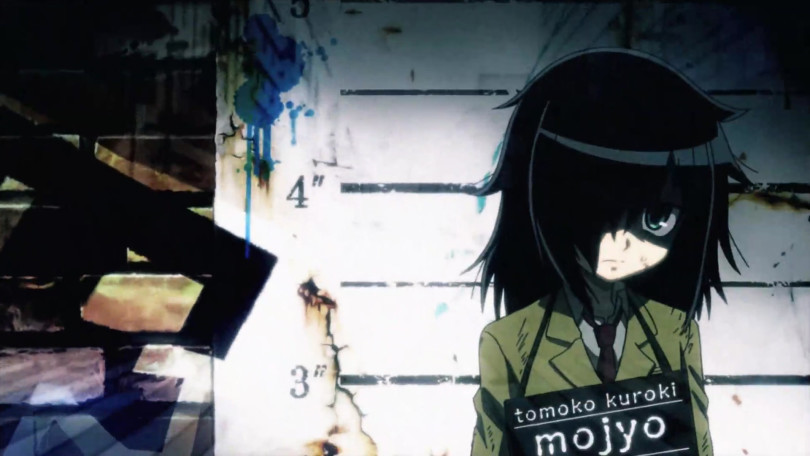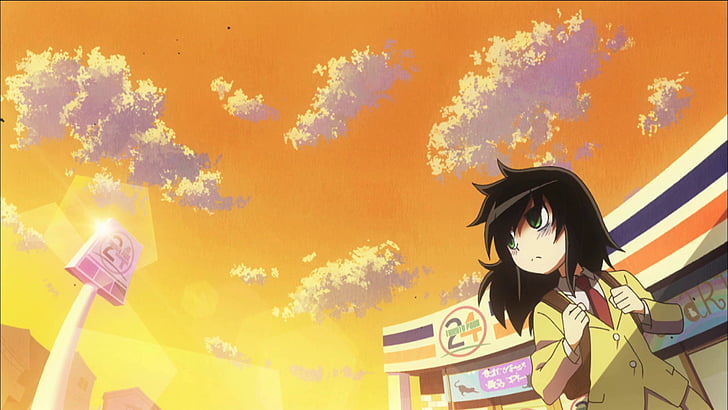Why one of anime’s most depressing comedies might not be such a downer after all
“This is a story about a girl… an unpopular girl… and her story that really doesn’t matter.”
The anime Watamote opens its first episode with these words spoken by the show’s narrator – the first of the only two lines he utters in the entire series. It’s said as our heroine, Tomoko Kuroki, is looking up the slang term mojyo (unpopular girl) online. The baggy-eyed teen proudly swivels her chair to face the viewer.
“Ha! That isn’t me. I’m not one of those unpopular girls.”

As the viewer discovers in the ensuing 13-episode emotional train wreck, Tomoko couldn’t be more wrong. She expects her debut into high school will bless her with all sorts of social benefits and respect she didn’t have as a shy middle-schooler, but it actually just brings further isolation – so much so that she forgets how to talk to people who aren’t her immediate family! While Tomoko does manage to (mostly) overcome that particular difficulty by the end of the first episode, the episodes that follow are a record of one hare-brained “get popular quick” scheme after another, all of which backfire hilariously.
This frustrates Tomoko to no end, because in her mind, she bears no responsibility for her own isolation other than other people being inherently stupid and horrible. That’s even the official long title for the anime: Watashi ga Motenai no wa Dou Kangaetemo Omaera ga Warui!, which translates in English to No Matter How I Look at It, It’s You Guys’ Fault I’m Not Popular!

Our heroine is tormented by the fact that she is becoming the very type of sad recluse she looked down on in the first episode – a solitary teen with no boyfriend, only one regular friend who she seldom sees, and no admiration from her peers. This last item, the popularity she finds so elusive, is important because it’s an absence rather than a vacuum in Tomoko’s life. She isn’t hated or looked down on by anyone – the few who interact with her barely notice her. However, that’s not how Tomoko sees it at all.
For Tomoko, the world is a narcissist’s hell where everyone is watching her, everyone is judging her, and everyone is constantly taking her measure (as a person, peer, student, friend, and woman) and finding her lacking. Through it all, though, she is her own worst and most merciless critic. For all you can say about her borderline-demented view of the world and her ungenerous view of others, there is no one this girl judges more harshly by her impossible standards than herself.
For her, to be anything less than beautiful, popular, and accomplished means total failure in life. It means that she’s a nobody. It means her story doesn’t matter. She has internalized this message to the point where it squeezes her psyche like a vise.

I could recount any number of Tomoko’s spectacular fails here, but I want to skip ahead to the last few minutes of the final episode. After an awkward moment causes Tomoko to fumble her one brave attempt at reaching out to a new friend, she sits at home in her darkened room, reading the same text about mojyo girls she read in the anime’s opening scene. The narrator’s voice speaks again:
“This is a story about a girl… an unpopular girl… and her story that really doesn’t matter.”
Tomoko’s mother calls her down to supper, and Tomoko faces the screen and laughs.

“Seriously… it really doesn’t matter. Hahaha!”
Roll end credits.
When I first watched this episode and ended the series, I thought it was the final depressing coda to a series that cruelly played with the viewer’s hopes for its pathetic protagonist. After all her struggles, not only had Tomoko not gotten anywhere in her attempts to break out of isolation, but she had given up. Further thought put the situation in a new light, though. Yes, Tomoko had given up… but given up what?
In many ways, Watamote is a pointedly Millennial and Gen-Z tragedy. These generations have been supported and encouraged like almost none before them: “You are beautiful, wonderful, and special. You can do anything you put your mind to. You can change the world!” However, that level of encouragement also sets up sky-high expectations with a dark caveat: “If you aren’t beautiful, wonderful, or special, what good are you? Why can’t you accomplish anything? If you don’t change the world, if nobody pays attention to you, you obviously messed up somewhere.”

This shadow message is what torments Tomoko – and not just her, but many others her age and thereabouts. If she is unique, she’s only unique for internalizing all of the negative aspects at once and to ridiculous extremes. If she falls short…
In the anime’s final moments, Tomoko is acknowledging that perhaps, yeah, she did end up falling short of her ideal. She’s a petite, unassuming, flat-figured girl with permanent dark rings under her eyes, just-average intelligence, and no special talents. She has a hard time speaking to others and has only one friend. She’ll probably never be popular, and her chances of changing the world seem pretty slim.
But that’s okay. That doesn’t matter. It doesn’t have to.

Earlier in the same episode, Tomoko placed her phone on her desk with the “record” feature on to find out what others might be saying about her when she’s not around, with an eye toward using it as constructive criticism to help her become more popular. To her disappointment, nobody actually talked about her at all. Even later, when she repeated the experiment after dramatically squishing a cockroach, the conversation was not about her specifically. Ironically, the one time in the episode she is “talked about behind her back” is when the upperclassman girl she idolizes, Imae, praises her as “cute” and “determined” to her friends as Tomoko runs away from her in an anxiety-ridden panic.

One of the most difficult but most healing truths many of us internalize as we grow up or grow older is the old saying that “You wouldn’t worry so much about what others think of you if you realized how seldom they do.” Tomoko fails to grasp that her own desperate need for external validation is the source of her misery, not the lack of popularity itself, and that leads her into absurd behavior that leaves her even more embarrassed and alone. At the end of the anime, she doesn’t yet have quite enough maturity to grasp all of this.

Tomoko doesn’t yet realize that people might love her for her sort-of-lame self, or that they might find her eccentricities endearing or even kind of cool rather than embarrassing. She doesn’t yet understand that being truly loved by one or two people can bring a person more joy than shallow admiration from a crowd. She doesn’t quite understand all of that yet… but she does finally catch a glimmer of truth that all of her desperate flailing after popularity is an absurdity. It isn’t making her happier. And in the final analysis, it really doesn’t matter.

Watamote is a very dark comedy, without a doubt. It’s understandable why the series is so cathartic, and I can see other readings of the ending that aren’t nearly as rosy as my own. However, I think what we may have seen in Tomoko’s parting quip is a tormented soul who is finally learning to let go of unrealistic expectations for herself that are doing her more harm than good. The fate of a normal life is not a tragedy, and we are foolish and blind to our own blessings if we make it one. Tomoko Kuroki may never become popular or important, but perhaps she can still be herself and be happy, and perhaps that’s good enough.
No matter how you look at it, that’s a message many of us need to hear.



Life for tomoko gets better after the anime.
LikeLiked by 1 person
I love Tomoko
LikeLiked by 1 person
I Enjoyed Season 1 From The Series I Even Got The Manga From It Too. Hope Season 2 Happens In 2024 Or 2024
LikeLike